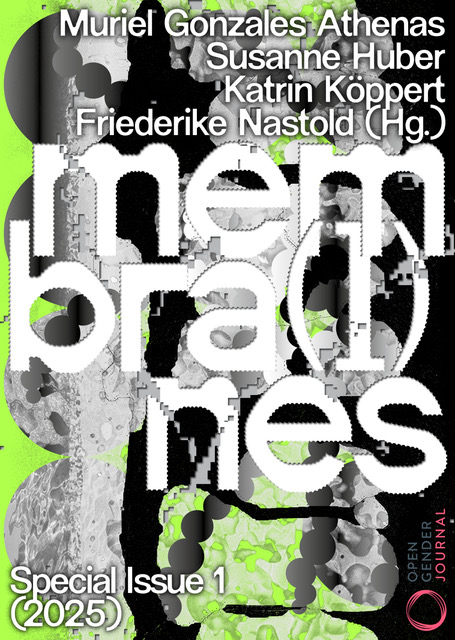Intimität erwecken/widerrufen. Wo sich queeres Plastik und die Ökopolitiken des Schwarzen Feminismus berühren
DOI:
https://doi.org/10.17169/ogj.2025.302Schlagworte:
Klimakolonialismus, Körper, Lust, Queer, Schwarzer FeminimusAbstract
Der folgende Text ist eine überarbeitete Fassung eines Gesprächs zwischen Ama Josephine Budge Johnstone und Heather Davis. Gemeinsam erörtern wir, wie Lust, Erotik und Intimität in unserer jeweiligen Arbeit manchmal als Ort der Befreiung und manchmal als Einschreibung in ökologische und soziale Gewalt aufgegriffen werden. Wir setzen uns mit diesen Ideen durch unsere unterschiedlichen Positionierungen sowie durch unsere Forschung zu Klimakolonialismus und Plastik auseinander.
Literaturhinweise
Ah-King, Malin/Hayward, Eva S. (2013): Toxic Sexes. Perverting Pollution and Queering Hormone Disruption. In: O-Zone: A Journal of Object-Oriented Studies 1, 1–12.
brown, adrianne maree (2019): Pleasure Activism. The Politics of Feeling Good. Stirling: AK Press.
Budge Johnstone, Ama Josephine (2021): Pollination as Practice. The Queer Temporalities of Intimate Ecologies. In: Brandt, Nicola/Whorrall-Campbell, Frances (Ed.): Conversation Across Place, Berlin: The Green Box, 69–85.
Davis, Heather (2022): Plastic Matter. Durham: Duke University Press. doi: 10.1215/9781478022374
Evans, Claire L. (2015): Why Every Gadget Feels Like Shark Dick. https://www.vice.com/en/article/ae38jk/why-every-gadget-feels-like-shark-dick (14.03.2025).
Gumbs, Alexis Pauline (2018): M Archive. After the End of the World. Durham: Duke University Press. doi: 10.1215/9780822371878
Jackson, Zakiyyah Iman (2020): Becoming Human. Matter and Meaning in an Antiblack World. New York: New York University Press. doi: 10.18574/nyu/9781479890040.001.0001
Klein, Naomi (2016): Let Them Drown. The Violence of Othering in a Warming World. In: London Review of Books 38 (11).
McKittrick, Katherine (2014): Sylvia Wynter. On Being Human as Praxis. Durham, NC: Duke University Press. doi: 10.1515/9780822375852
Mirzoeff, Nicholas (2014): Visualizing the Anthropocene. In: Public Culture 26 (2 (73)), 213–232. doi: 10.1215/08992363-2392039
Muñoz, José (2009): Cruising Utopia. The Then and There of Queer Futurity. Durham: Duke University Press.
Murphy, Michelle (2008): Chemical Regimes of Living. In: Environmental History 13 (4), 695–703.
Pennimann, Leah (2018): Farming While Black. Soul Fire Farm’s Practical Guide to Liberation on the Land. White River Junction, VT: Chelsea Green Publishing.
Wynter, Silvia (1994): No Humans Involved. An Open Letter to My Colleagues. In: Forum N.H.I. Knowledge for the 21st Century 1 (1), 1–17.

Downloads
Veröffentlicht
Zitationsvorschlag
Ausgabe
Rubrik
Lizenz
Copyright (c) 2025 Ama Budge Johnstone, Heather Davis

Dieses Werk steht unter der Lizenz Creative Commons Namensnennung 4.0 International.
Alle Beiträge in Open Gender Journal erscheinen unter der Lizenz Creative Commons Namensnennung 4.0 International (CC BY 4.0). Die entsprechenden Texte dürfen Sie unter den Bedingungen der Lizenz frei nutzen (Lizenzvertrag, allgemeinverständliche Fassung). Es findet keine exklusive Übertragung von Verwertungsrechten („copyright transfer“) an die Zeitschrift statt. Open Gender Journal stellt den Autor*innen keinerlei Kosten für die Publikation (sogenannte Article Processing Charges, APC) oder die Einreichung (sog. Submission Charges) in Rechnung. Die Autor_innen werden ermutigt, ihre Beiträge auch an anderen Orten, z.B. in Repositorien, einzustellen.












